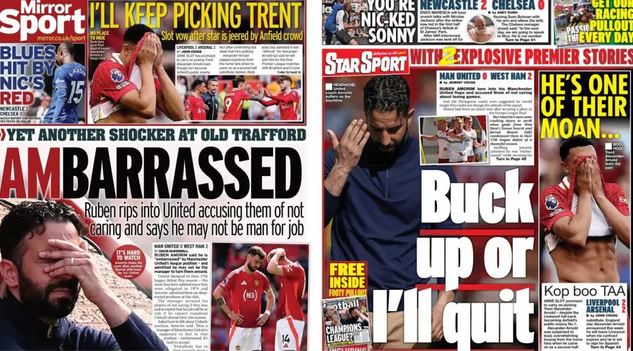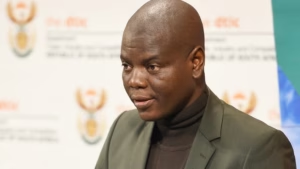Speculation surrounding Ruben Amorim’s future at Manchester United has intensified after a weekend packed with controversy, drama, and raw admissions from the manager himself. As stories swirled across British sports media, perhaps the most surprising development came from Amorim’s own comments, which many interpreted as an unusual moment of professional vulnerability and, to some, even a resignation in all but name.
“It’s not the players’ fault. It’s my fault; I’m responsible.”
These words, uttered by the Manchester United manager after their latest dismal performance, stood in stark contrast to the usual guarded or deflective responses seen from Premier League coaches under pressure. Instead of seeking scapegoats or deploying veiled references, Amorim accepted full responsibility for the team’s shortcomings.
In a post-match briefing, he continued to express his disappointment with the internal culture of the team and the club at large. Speaking to the written media, he clarified his stance, resisting any temptation to place blame on his players.
“I don’t want to talk about players. I’m talking about myself and the culture in the club and the culture in the team.”
His tone suggested a deep-rooted frustration, not just with the results on the pitch, but with what he perceives as systemic issues that cannot be fixed overnight.
“I have that feeling, we need to change that and we need to be really strong in the summer and to be brave because we will not have a next season like this.”
“If we start like this, or if the feeling is still here, we should give the space to different persons.”
While these comments reflect a manager willing to take accountability, some in the media have interpreted them more dramatically. The Daily Star went as far as to headline with “Buck up or I’ll quit,” characterising Amorim’s statements as an ultimatum, suggesting he is issuing threats rather than simply being introspective.
Yet this appears to distort his actual message. Amorim’s repeated insistence that the blame lies with him, and not with his squad, makes such interpretations questionable at best. The Daily Mirror’s portrayal of him “ripping into” Manchester United, or the Star’s description of him “tearing into his Manchester United flops”, is at odds with what was plainly stated.
“It’s not the players’ fault.”
This consistency in his messaging contradicts the idea that he is using media coverage as a weapon against his team or the club. Rather, it underscores a manager wrestling with a crisis of leadership and direction.
Meanwhile, The Express introduced another angle to the narrative, publishing a headline that read:
“Man Utd ‘have sack plan’ as Ruben Amorim accepts his fate after West Ham defeat”
This claim, however, was not attributed to any named source. Instead, the supposed basis for this assertion appears to stem from a months-old Q&A conducted by The Athletic’s Laurie Whitwell in early April. At the time, Whitwell offered insight into how long Amorim might realistically be given, should the club’s results continue to falter.
“As he repeated again post Forest, he will not get time if results continue as they are. United cannot be 13th again next season. Clearly the board, Ratcliffe, Brailsford, Berrada, want him to work as otherwise it would look very bad on them.”
While that comment was perhaps speculative in nature, it has now been recycled into what is being presented as breaking news. The apparent extrapolation of Whitwell’s words into a so-called ‘sack plan’ is indicative of a broader trend in modern football journalism—where implications are treated as declarations.
Adding fuel to the fire, The Mirror ran a headline suggesting inside knowledge of the club’s top-level deliberations:
“Sir Jim Ratcliffe’s stance on sacking Ruben Amorim after brutal Man Utd admission”
But a closer inspection reveals no new remarks from Ratcliffe, only a recycling of past comments in which he expressed support for Amorim’s efforts. The narrative relies on a presumption that an earlier opinion remains unchanged—an assumption that may not reflect the realities of an evolving situation.
Sunday’s events also provided a chaotic backdrop to this story. While Amorim was defending his team and placing the burden on himself, other storylines were erupting across the Premier League. Nottingham Forest’s owner made headlines with his animated pitch-side outburst, while Liverpool supporters were audibly critical of Trent Alexander-Arnold, another figure in the footballing crossfire. Yet it was Amorim’s introspection that resonated most clearly, raising eyebrows not only for what he said, but for how candidly he said it.
It is, after all, rare for a top-flight manager to acknowledge, without caveat or euphemism, that he is failing to motivate his squad effectively. He went as far as to acknowledge his own limitations in reaching players across different competitions.
This degree of honesty may be admirable to some, yet in the ruthless world of elite football management, it can also be construed as weakness—or an invitation for the boardroom to act. As history has often shown, vulnerability can invite speculation, and speculation can snowball into a media-fuelled sense of inevitability.
What complicates the picture further is that Amorim’s words, while unfiltered, do not directly call for change at the executive level. Instead, they suggest an individual weighing the immense responsibility of leadership in a club caught in transition. Manchester United, still in the throes of reorganisation under new part-ownership and with a shifting footballing hierarchy, remains far from settled.
Whether or not the so-called ‘sack plan’ exists remains to be seen. But what is clear is that public discourse surrounding Amorim’s future has now been reframed—not by an official statement or boardroom leak, but by the manager’s own willingness to be held accountable in a moment of rare Premier League candour.
For now, Amorim remains in place, determined to find solutions and restore pride to a faltering campaign. But in a club as scrutinised and politicised as Manchester United, honesty, while commendable, does not always shield one from consequence.

















